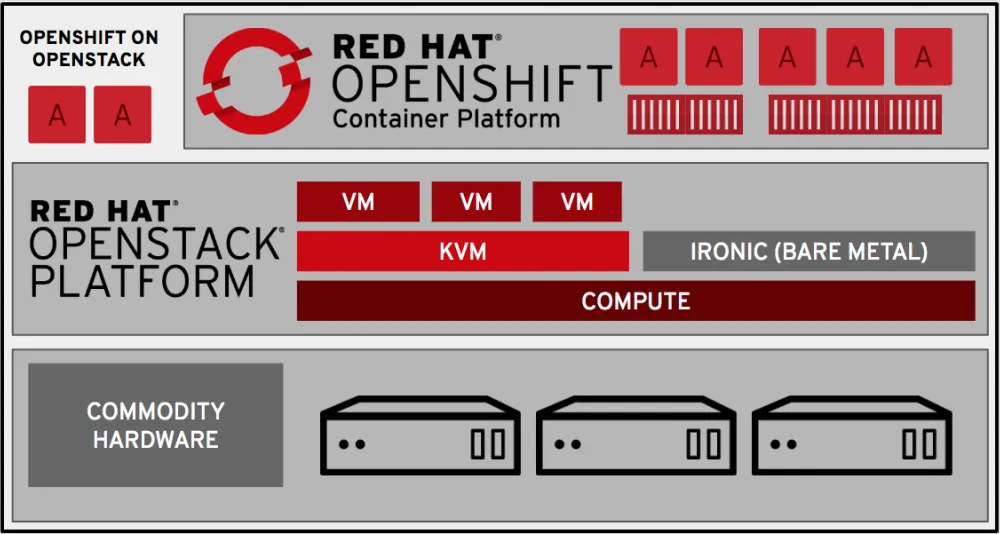Market trends show that due to long application life-cycles and the high cost of change, enterprises will be dealing with a mix of bare-metal, virtualized, and containerized applications for many years to come. This is true even as greenfield investment moves to a more container-focused approach.
Red Hat® OpenStack® Platform provides a solution to the problem of managing large scale infrastructure which is not immediately solved by containers or the systems that orchestrate them.
In the OpenStack world, everything can be automated. If you want to provision a VM, a storage volume, a new subnet or a firewall rule, all these tasks can be achieved using an easy to use UI or with a command line interface, leveraging Openstack API’s. All these infrastructure needs might require a ticket, some internal processing, and could take weeks. Now such provisioning could all be done with a script or a playbook, and could be completely automated.
The applications and workloads can specify cloud resources to be provisioned and spun up from a definition file. This enables new levels of provision-as-you-need-it. As as demand increases, the infrastructure resources can be easily scaled! Operational data and meters can trigger and orchestrate new infrastructure provisioning automatically when needed.
On the consumption side, it is no longer a developer ssh’ing into a server and manually deploying an application server. Now, it’s simply run a few OpenShift commands, select from a list of predefined applications, language runtimes, databases, and then just have those resources provisioned, on top of the target infrastructure that was automatically provisioned and configured.
Red Hat OpenShift Container Platform gives you the ability to define an application from a single YAML file. This makes it convenient for a developer to share with other developers, allowing them to launch an exact copy of that application, make code changes, and share it back. This capability is only possible when you have automation at this level.
Infrastructure and application platforms resources are now exposed differently in an easy and consumable way, and the days when you needed to buy a server, manually connect it to the network and install runtimes and applications manually are now very much a thing of the past.

With Red Hat OpenShift Container Platform on Red Hat OpenStack Platform you get:
A WORKLOAD DRIVEN I.T. PLATFORM: The underlying infrastructure doesn’t matter from a developer perspective. Container platforms exist to ensure the apps are the main focus. As a developer I only care about the apps and I want to have a consistent experience, regardless of the underlying infrastructure platform. Openstack provides this to Openshift.
DEEP PLATFORM INTEGRATION: Networks (kuryr), services (ironic, barbican, octavia), storage (cinder, ceph), installation (openshift-ansible) are all engineered to work together to provide the tightest integrations across the stack, right down to bare metal. All are based in Linux® and engineered in the open source community for exceptional performance
PROGRAMMATIC SCALE-OUT: OpenStack is 100% API driven across the infrastructure software stack. Storage, networking, compute VM’s or even bare metal all deliver the ability to scale out rapidly and programmatically. With scale under workloads, growth is easy.
ACROSS ANY TYPE OF INFRASTRUCTURE: OpenStack can utilise bare metal for virtualization or for direct consumption. It can interact with network switches and storage directly to ensure hardware is put to work for the workloads it supports.
FULLY MANAGED: Red Hat CloudForms and Red Hat Ansible Automation provide common tooling across multiple providers. Ansible is Red Hat’s automation engine for everything, and it’s present under the hood in Red Hat CloudForms. With Red Hat Openstack Platform, Red Hat CloudForms is deeply integrated into both the overcloud, the undercloud, and the container platform on top. Full stack awareness means total control. And our Red Hat Cloud Suite bundle of products provides access to OpenStack and OpenShift, as well as an array of supporting technologies. Red Hat Satellite, Red Hat Virtualization, Red Hat Insights, and even Red Hat CloudForms are included!
A SOLID FOUNDATION: All Red Hat products are co-engineered with Red Hat Enterprise Linux at their core. Fixes happen fast and accurately as all components of the stack are in unison and developmental harmony. Whether issues might lie at the PaaS, IaaS or underlying Linux layer, Red Hat will support you all the way!
Red Hat Services can help you accelerate your journey to Hybrid Cloud adoption, and realize the most value of best-of-breed open source technology platforms such as OpenShift on top of Openstack. Want to learn more about how we can help? Feel free to reach out to me directly for any questions, slefrere@redhat.com. Or download our Containers on Cloud datasheet.
Sull'autore
Altri risultati simili a questo
Redefining automation governance: From execution to observability at Bradesco
Building the foundation for an AI-driven, sovereign future with Red Hat partners
Data Security And AI | Compiler
Data Security 101 | Compiler
Ricerca per canale
Automazione
Novità sull'automazione IT di tecnologie, team e ambienti
Intelligenza artificiale
Aggiornamenti sulle piattaforme che consentono alle aziende di eseguire carichi di lavoro IA ovunque
Hybrid cloud open source
Scopri come affrontare il futuro in modo più agile grazie al cloud ibrido
Sicurezza
Le ultime novità sulle nostre soluzioni per ridurre i rischi nelle tecnologie e negli ambienti
Edge computing
Aggiornamenti sulle piattaforme che semplificano l'operatività edge
Infrastruttura
Le ultime novità sulla piattaforma Linux aziendale leader a livello mondiale
Applicazioni
Approfondimenti sulle nostre soluzioni alle sfide applicative più difficili
Virtualizzazione
Il futuro della virtualizzazione negli ambienti aziendali per i carichi di lavoro on premise o nel cloud
